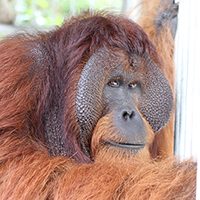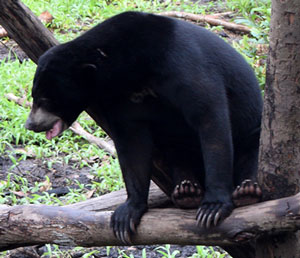Dear Friends of OFI, The crisis face orangutans and forests in Borneo is getting worse. As a long-time supporter and friend, we urgently ask for your help to prevent the further annihilation of wild orangutan populations and Indonesian forests by wildlife traffickers, poachers, and illegal loggers. As forests in Borneo are being increasingly ravaged by… Continue reading Help us prevent wildlife trafficking to keep orangutans and other Bornean wildlife, wild.
Month: July 2019
Bear of the Month for July, 2019: ORI,
Komet’s best friend
Some sun bears are instantly more recognisable than others, Ori is one of them, with his big head and wide set eyes. He sports a white bib like chest patch. During morning feeding he bounds into the communal area with gusto, requiring much “fuel for the fire” for the day to come. At the time… Continue reading Bear of the Month for July, 2019: ORI,
Komet’s best friend


